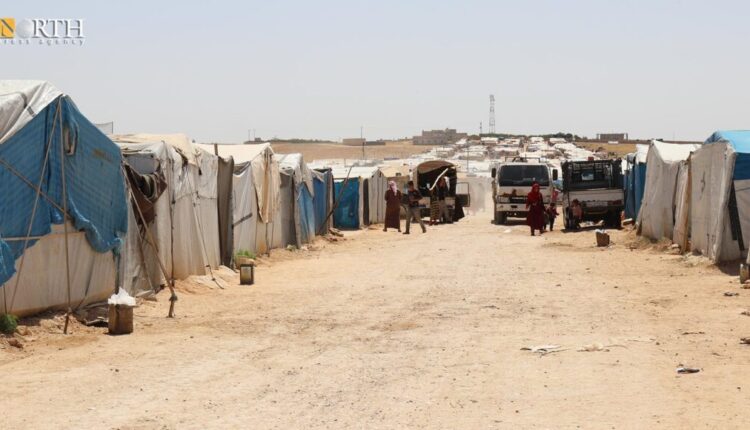MANBIJ, Syria (North Press) – Al-Ali complains about the accumulation of garbage and filth inside the New Eastern Manbij camp in the city of Manbij, northern Syria, that brought harmful insects due to lack of hygiene and municipal services, which increased women’s burdens.
Khadija al-Ali, 50, IDP from Deir Hafir eastern Aleppo residing in the New Eastern Manbij camp, said the camp’s IDPs have frequently demanded garbage collectors due to increasing insects and filth.
The residents at the New Eastern Manbij camp complain about the spread of insects that cause diseases due to the accumulation of filth and lack of hygiene inside the camp with the onset of summer and increasing temperatures.
Al-Ali said that the women clean the camp. They clean spaces between tents, bathrooms, and the sewage line amid absence of garbage collectors and municipality workers.
She stressed that the camp’s residents are facing a serious crisis and intense suffering that make their living conditions harder.
She told North Press that in tandem with the increasing temperatures, poisonous insects emerged, causing allergies among adults and children in addition to fever and itching.
She, along with other IDPs in the camp, wishes the camp be clean, appealing to relevant authorities to bring back the garbage collectors.
The New Eastern Manbij camp is located southeast of the Manbij and houses 625 families, with a total of 3,395 individuals, from the regions of Maskana and Deir Hafir, and the Old Eastern Manbij camp, which houses 387 families, with a total of 1,795 individuals.
In summer, the IDPs suffer more due to increasing temperature as filth accumulates and water is scarce, not to mention the spread of harmful insects amid the absence of humanitarian organization.
It is worth mentioning that Manbij and its countryside is held by the Autonomous Administration of North and East Syria (AANES), where a number of registered camps and makeshift others spread.
However, several crossings connect the city to areas held by the government and the opposition areas, but political differences between the three parties affect the crossings.
Moreover, the withdrawal of a number of NGOs from areas and camps in North and East Syria is attributed to the successive Turkish attacks the region witnesses and increasing activities by Islamic State (ISIS).
The camps in AANES-held areas have been the site of aggravated suffering as a result of the failure of NGOs and the UN to provide humanitarian and medical support. The withdrawal of humanitarian organizations exacerbated their situation, according to AANES officials.
The closure of al-Ya’rubiyah (Tel Kocher) border crossing with Iraq has also increased the sufferings of the IDPs in camps and residents of the region as well.
In July 2014, the UNSC adopted Resolution 2165 which authorized the UN to deliver cross-border humanitarian aid to Syria through four crossings: al-Ramtha crossing with Jordan, Bab al-Salameh and Bab al-Hawa with Turkey, and al-Ya’rubiyah with Iraq, without the consent of the Syrian government.
In January 2020, UN Res. 2504 was adopted which reduced the number of border crossings to only Bab al-Salameh and Bab al-Hawa for six months open to renewal in a special meeting by the UNSC.
Imad al-Hassan, 38, IDP from Deir Hafir, who lives with his family in the New Eastern Manbij camp, complains about the increasing filth in the camp and spread of diseases among the people.
He told North Press, “Diseases such as cholera, leishmaniasis, and others have spread in the camp,” calling on NGOs to find a solution for this dilemma.
He added, “Honestly, you cannot enter the bathrooms. You can see the filth.”
“The municipality’s garbage truck comes every week or ten days and takes the garbage,” he added.
The IDPs in the new Eastern Manbij camp demand humanitarian organizations and relevant authorities to provide assistance and support, considering the difficult conditions they go through.
According to al-Hassan, the garbage and flies worsened the situation for the people in the camp and caused diseases especially among children, noting that a child was infected with cholera due to insects that infect the food.
Two years ago, NGOs used to help with hygiene in the camp through hiring IDPs to do the cleaning work periodically so that many could benefit in return of a daily wage.
Therefore, Hamoud al-Dandal, 59, IDP from the region of Maskana living in the same camp, hopes that humanitarian organizations and relevant authorities focus more on hygiene and removing garbage and waste in the camp.
Al-Dandal believes that the frequency of the garbage truck’s tour is “not sufficient.” They come twice a week, but they should come three days a week.
He also demands an extra day for the garbage truck to come and remove the garbage from the camp.
“The increasing filth and insects in the camp are beyond imagination. Many cases of leishmaniasis have been recorded in the camp,” he complained to North Press.

